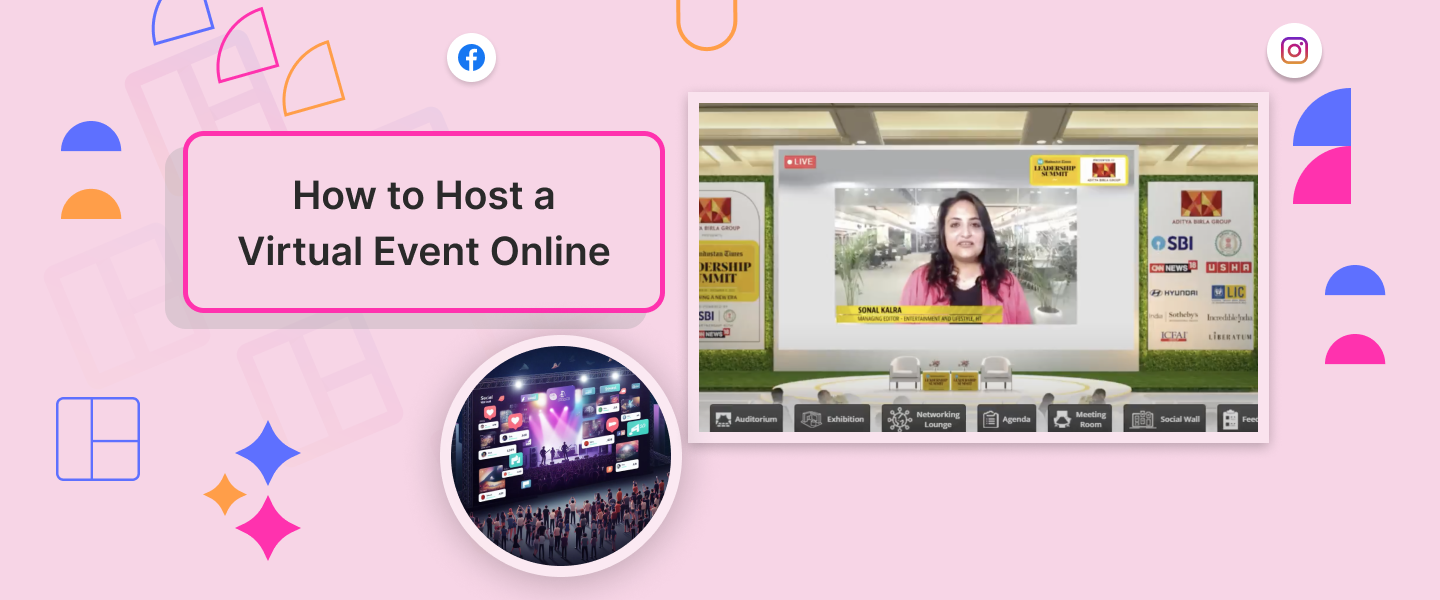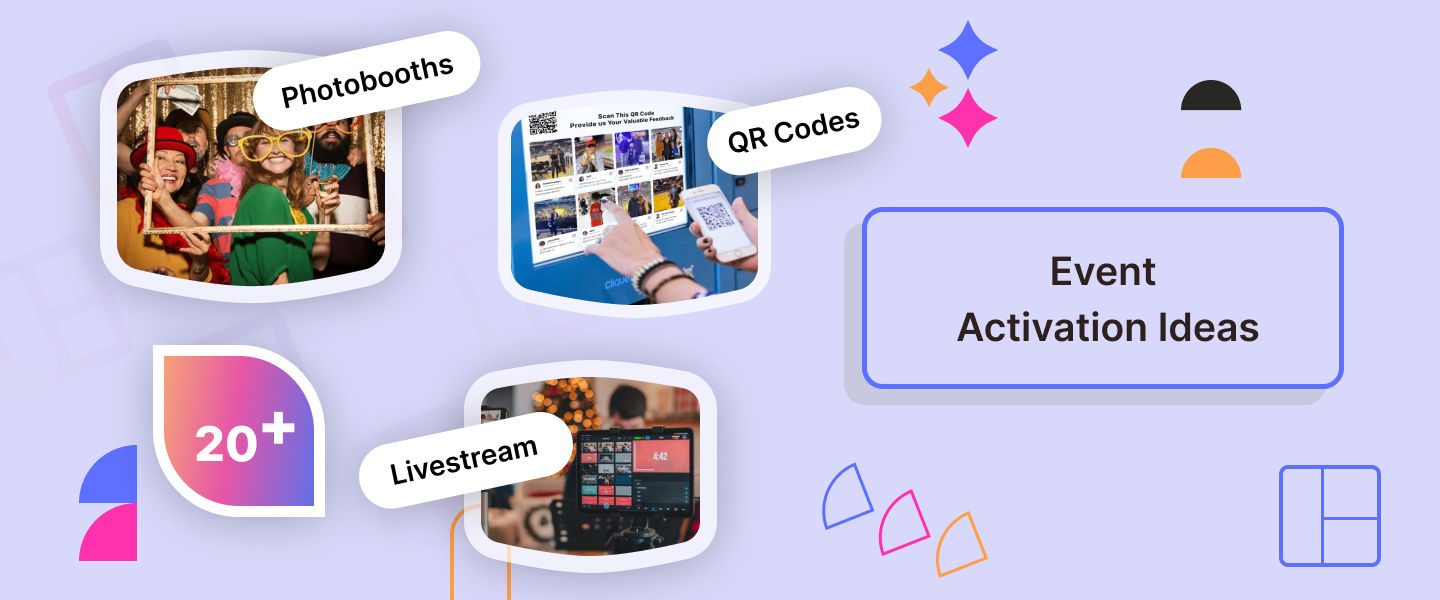September 6, 2024
Have you ever wondered how smoothly events have transformed into virtual ones, creating an engaging and interactive experience for users in the comfort of their homes?
Hosting digital events has become valuable for every organization in this virtual connectivity era.
Do you want to become a pro in hosting virtual events? Well, hosting a virtual event requires the same care and attention as an in-person one. We know crafting a perfect digital event strategy is hard, and we are here to help you. In this blog, we will walk you through how to host a successful virtual event that will be a huge success. This article will offer tips and tricks, including best practices for virtual events to leave a lasting impression. Without much wait, let’s quickly get started:
What Is a Virtual Event?

A virtual event is an online business-driven event that people can join from across the world virtually. It is a digital alternative to traditional events where people with similar interests and industry leaders come together to discuss and share valuable information.
These events can be anything, from small private events to significant events with thousands of people. Nowadays, you can easily design personalized events with tools like Social Walls and create an interactive event experience for your attendees.
Difference Between In-person Events and Virtual Events
Virtual events and in-person events are precisely opposites. Virtual events are often held remotely and streamed live, whereas in-person events have a live and physically present audience, venue, and other requirements as per the event.
Let’s look at the pros and cons of both types of events:
Pros and Cons of in-person events
Let’s look at some of the pros and cons of in-person events:
Pros:
- Personal Interaction– In-person events are significant for personal interactions. Face-to-face communication allows deeper connections and understanding.
- Creates a memorable experience—In-person events leave a lasting impression on attendees. With a unique environment and personal learning, attendees form memories they will never forget.
- Building relationships—Physical events often help form professional networks and collaboration, thus building stronger relationships and a loyal community.
Cons:
- High Cost of the Event—In-person events often involve higher costs than virtual ones. This can include the cost of the venue, catering, logistics, etc., whereas the attendees also bear the cost of travel, accommodation, etc.
- Time-consuming—Physical events require a commitment of time. This can be challenging for professionals and may result in low attendance.
- Logistic Limitations—Organizing physical events may involve many logistic complexities, such as venue selection, catering needs, etc. This may result in high costs and low event frequency.
Pros and Cons of Virtual Events
The pros and cons of virtual events include:
Pros:
- More convenient in terms of travel and time- Virtual events eliminate the need for physical presence, thus saving time and providing easy accessibility.
- Provides better feedback because of analytical tools – Digital platforms like Social Walls provide an in-depth analysis of any events, thus helping in improving future events
- Low cost and larger audience reach—Virtual events save costs and help reach a larger audience, as attendees can easily attend the events from the comfort of their homes.
Cons:
- Technical glitches- Virtual events rely heavily on technology, sometimes making connecting challenging for everyone.
- Lack of personal touch—Virtual events lack personal touch as there is less interaction among attendees compared to physical events.
- Less engaging as compared to offline events—Gripping the attention of the attendees in virtual events seems difficult due to a lot of distractions. The attendees may get bored due to the monotonous event.
Several factors must be considered when deciding which type of event to choose. Consider the purpose, budget, demographics, and other factors, and then opt for the best one for your event.
Types Of Virtual Events
Let’s take a closer look at different types of virtual events. Although there are many types of virtual events, let’s look at some of them:
Virtual Conference

Virtual Conferences include professional learning and discussions. Like in-person conferences, this corporate event idea revolves around a live agenda that includes keynotes, sessions, breaks, etc. Attendees can easily watch the event live and personalize their schedules. Virtual conferences also have the option to pre-record or live-stream the content.
Virtual conferences are excellent, significant, annual events that attract a large audience. They help with brand awareness, community building, and lead generation.
Virtual Trade Show

A virtual trade show is a digital event activation idea that showcases a company’s products and services, and attendees can gain valuable industry knowledge. When hosted virtually, these trade shows can help attract exhibitors, assist in lead generation, and even build a sales pipeline. Virtual trades allow organizations to reach worldwide and set up business globally. Attendees have access to product demos, catalogs, and support services, which builds consumer trust and helps them make informed purchase decisions.
Virtual Exhibitions

Virtual exhibitions are digital presentations of your new product or ideas using virtual software to a global audience. This is a great brand activation idea as it helps attract a large number of audiences and visitors. They also allow businesses and artists to grow their businesses and connect with potential customers and suppliers while providing an opportunity to learn new insights.
You can also host a 3D virtual exhibition. A 3D online exhibition occurs over a virtual platform encompassing a 360-degree environment. Apart from a whole new digital event experience that a virtual venue brings to the attendees, it also has live tools to help them enjoy seamless connectivity & networking.
Hybrid Events

Hybrid events combine in-person and virtual components, allowing attendees to participate from anywhere in the world. These events include seminars, career fairs, conferences, or other gatherings.
Research by Markletic shows that 47% of respondents saw a positive ROI from their hybrid event in as little as 3-6 months and 86% within 6-12 months. Combining both elements will give you a broad spectrum of options to deliver an epic event experience.
Webinars
Webinars are considered the most common type of virtual event, and you can watch your favorite webinar on any topic of your choice any day. They are easily discoverable on your emails, social media feeds, through any banner ads, etc. They are highly interactive and engaging and help in building a great community. Webinars are perfect for educational-based content. You can even deliver product presentations, tutorials, lectures, and panel discussions.
Workshops

A workshop is a structured session designed to create an interactive learning environment and produce excellent learning outcomes. Workshops typically involve a trainer or facilitator who designs the presentations, plans collaborative activities, and ensures the workshop will lead to the desired result.
Workshops involve various hands-on activities, such as group discussions, simulations, and collaborative exercises, that allow participants to explore, ideate, and participate in achieving their desired learning impact.
How to Host a Virtual Event
To be honest, hosting a virtual event is challenging, but with proper planning and strategy, anyone can become a pro. To make your planning easy, we have developed a guide on hosting a successful virtual event that gives you great success.
Set Clear Goals
First things first, be clear with your goals. Whether it is a virtual conference, virtual fair, career fair, trade show, or any other event you prefer. At the same time, identify your target audience so that it becomes easy for your team to organize and plan accordingly. It is important to note that goals and objectives are different for organizers and attendees.
For example, organizers’ goals include generating more awareness, sharing the brand vision, sharing information, ideas, or new research, launching new products, or hiring tracking new resources.
Participants’ goals will include contacting job providers, gaining valuable insights, and seeking a more significant learning environment.
Choose the Right Virtual Platforms
Plenty of platforms are available in the market with great features and moderation tools. For example, Social Walls is a great platform to host virtual events for your organization. With various customized designs and themes, Social Walls also provides AI moderation features and in-depth analysis.
Choose that Perfect Time!
You must ensure that the time of event hosting is convenient for the participant. Consider the holiday season, different time zones, and a time after work while planning for any event. You can ask your audience the time of their preference through a survey, polls, or other methods.
Promote it Like a Pro!
Now that you know your goals and target audience, it’s time to promote your event. Make sure to advertise your event well to gather more people for your event. Spread the word on social media platforms, list them on event listing platforms, and even promote it offline by collaborating with various people on the go! Plan your budget to promote your event well and avoid any hindrances.
Choose the Networking Features
Attendees will feel lethargic if your event needs more engagement and interaction. Various tools are available to provide your event with great networking features. Look for elements like group chat tools, spatial connect features, polls, live features, keynotes, etc.
Prepare to Troubleshoot
You might be ready with the alternative platform. Your platform might face any technical challenges related to videos, audio, or connectivity during your event. This saves time and will help avoid any mishap due to the event.
Have Fun with the Process
Nobody is interested in boring and monotonous events. Think out of the box and have fun with your audience during the event to make it more memorable and attractive. Gamify your events by hosting enjoyable hunts, quizzes, polls, etc. This increases the time your audience spends at your event and sets a lasting impression of your organization, ultimately improving the quality of leads.
Conclusion
The idea of hosting a virtual event is a great way to strengthen your online presence. You can achieve exceptional results with clear goals and objectives and a focus on creating an excellent experience for your attendees.
Choose a platform that aligns with your event goals and requirements. We hope this blog has helped you out and given you a guide to hosting a successful virtual event. Kickstart your virtual hosting journey with Social Walls today and skyrocket your engagement and interaction.




